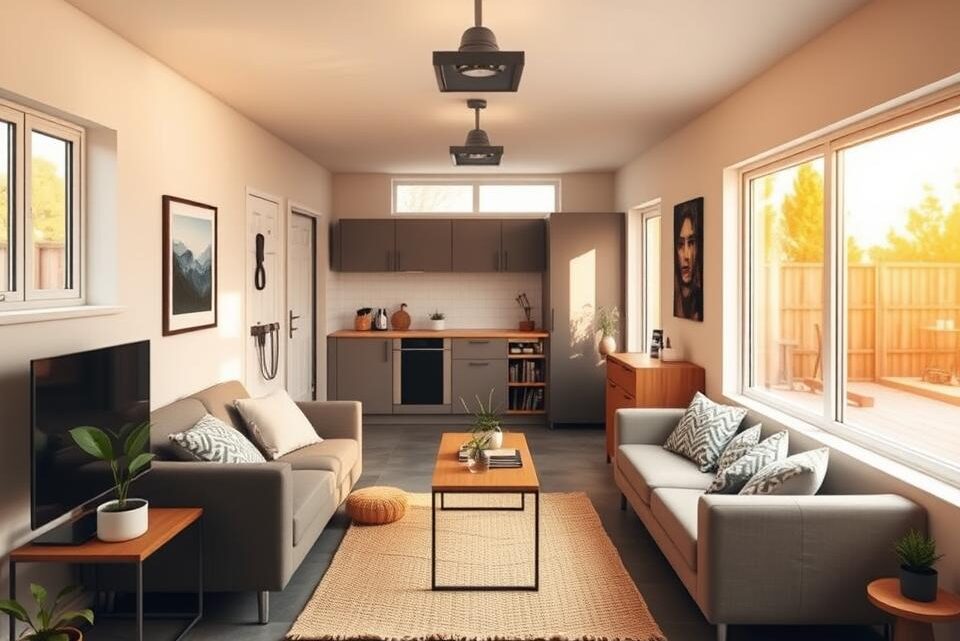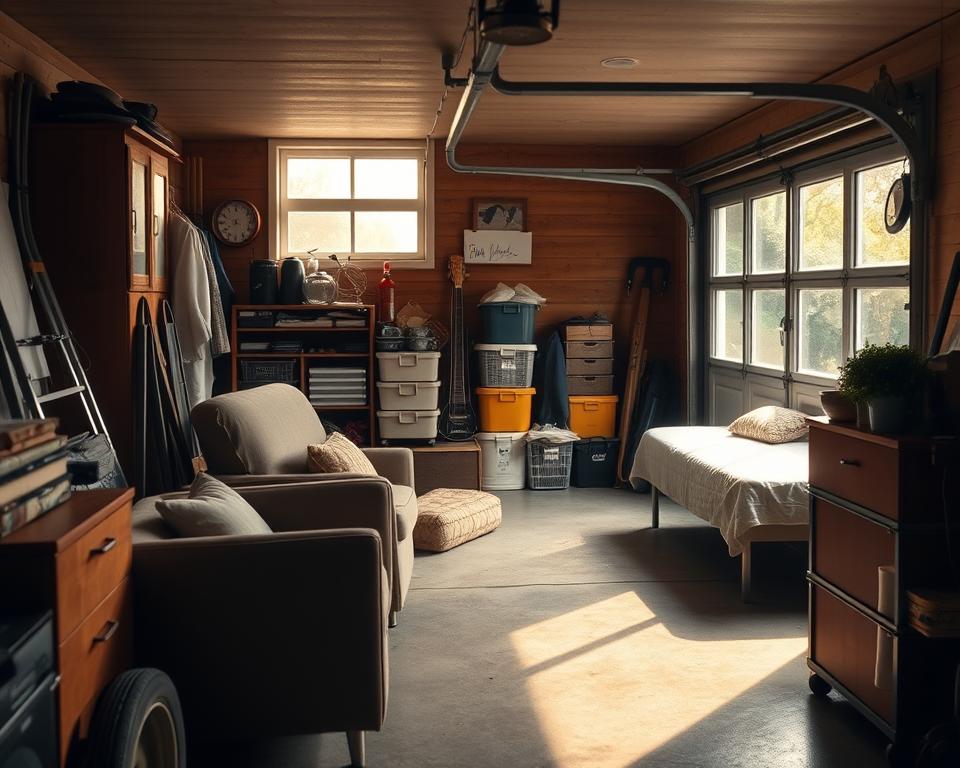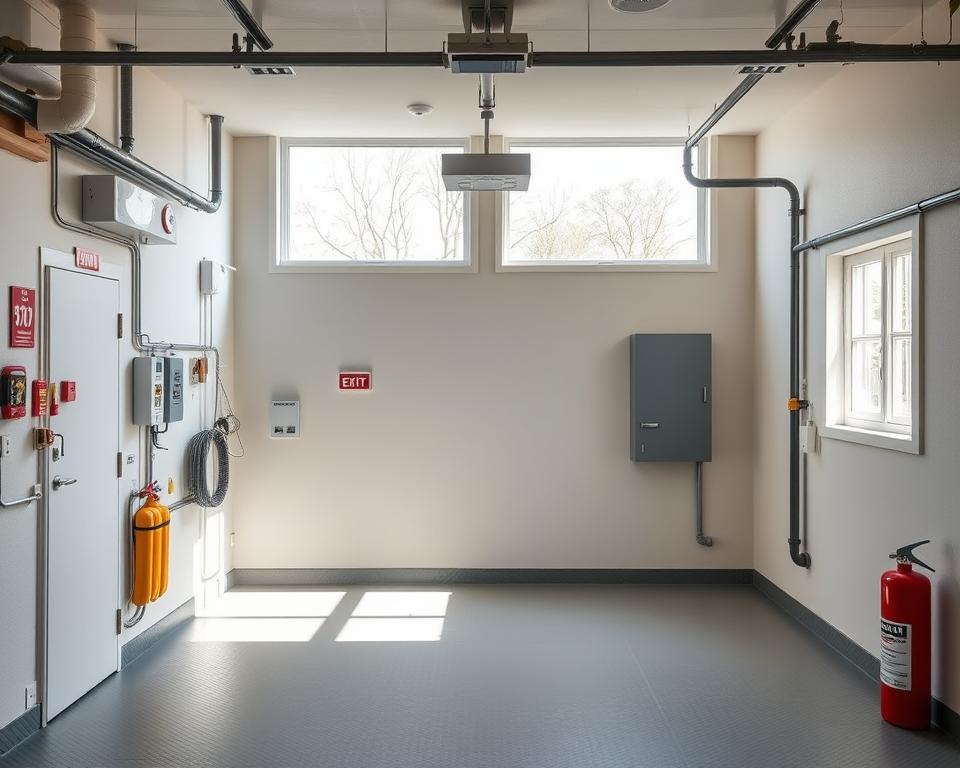can you legally live in a garage in the uk?

Exploring the complexities of garage living legality in the United Kingdom reveals a nuanced landscape of regulations and potential challenges. Many homeowners contemplate converting their garage into a residential space, but the legal pathway is far from straightforward.
The question of whether you can legally live in a garage in the UK depends on multiple factors, including local planning permissions, building regulations, and specific property characteristics. Property owners must navigate a complex web of legal requirements before transforming a garage into a habitable living space.
Residential conversion involves significant considerations beyond mere structural changes. Local authorities scrutinise numerous aspects to ensure safety, habitability, and compliance with national housing standards.
Inhaltsverzeichnis
Key Takeaways
- Garage living legality requires comprehensive legal assessment
- Building regulations play a crucial role in conversion approval
- Local authority permission is essential for residential transformation
- Structural modifications must meet strict UK housing standards
- Professional guidance is recommended for potential garage conversions
Understanding UK Housing Laws and Garage Conversions
Navigating the legal landscape of garage conversions in the United Kingdom requires a comprehensive understanding of UK housing laws and building regulations. Property owners must carefully consider multiple legal aspects before transforming their garage into a living space.
Garage conversions involve complex legal considerations that go beyond simple home improvements. The process demands meticulous attention to several critical factors:
- Compliance with local building regulations
- Obtaining necessary planning permission
- Meeting residential space standards
- Ensuring structural integrity
Building Regulations and Planning Permission Basics
UK housing laws mandate strict guidelines for converting garages into habitable spaces. Property owners must secure appropriate planning permission from their local authority before commencing any conversion work. The specific requirements can vary depending on the property’s location and existing structural characteristics.
Legal Definition of Residential Space
A legally recognised residential space must meet specific criteria outlined in building regulations. These standards encompass:
- Minimum ceiling height
- Adequate natural lighting
- Proper ventilation
- Sufficient thermal insulation
Local Authority Requirements
Each local council in the UK has unique regulations governing garage conversions. Homeowners must engage directly with their local planning department to understand specific building regulations and submission processes. Professional architectural guidance can simplify this complex navigation of legal requirements.
Successful garage conversions demand thorough research and professional consultation to ensure full legal compliance.
Can You Legally Live in a Garage in the UK?

Navigating the legal landscape of garage living legality in the UK requires careful consideration of residential space requirements. Property owners often wonder about the potential of transforming their garage into a habitable space.
The legality of living in a garage depends on several critical factors:
- Compliance with local planning regulations
- Meeting building control standards
- Obtaining necessary permissions from local authorities
- Ensuring the space meets minimum residential standards
Local councils have strict guidelines about converting garages into living spaces. Not all garages can be legally transformed into residential accommodation. Key considerations include:
- Structural integrity of the existing building
- Adequate insulation and ventilation
- Proper electrical and plumbing installations
- Fire safety provisions
“Converting a garage isn’t simply about adding living space – it’s about creating a safe, legal, and compliant residential area,” says Sarah Thompson, a property legal expert.
Homeowners must submit detailed plans to their local planning department. The residential space requirements are stringent, demanding precise measurements, safety features, and adherence to national building regulations.
Garage living legality isn’t a straightforward yes or no. Each case is unique, requiring individual assessment by local authorities to determine potential residential use.
Essential Requirements for Converting a Garage into Living Space
Transforming a garage into a functional living space requires careful planning and adherence to specific safety standards in the UK. Garage conversion UK projects demand meticulous attention to structural, regulatory, and safety considerations to ensure a comfortable and legal living environment.

Before beginning your garage conversion, several critical requirements must be addressed to create a safe and compliant living space:
Structural Modifications
Structural integrity is paramount when converting a garage into habitable accommodation. Key considerations include:
- Reinforcing existing foundations
- Checking load-bearing walls
- Ensuring proper floor levelling
- Installing appropriate damp-proofing
Insulation and Ventilation Standards
Proper insulation and ventilation are crucial for creating a comfortable living space that meets UK building regulations. Essential elements include:
- Thermal insulation in walls and roof
- Adequate window ventilation
- Moisture control mechanisms
- Energy efficiency improvements
Fire Safety Measures
Safety standards demand comprehensive fire protection strategies for garage conversions. Critical fire safety requirements include:
- Installing smoke detectors
- Creating emergency escape routes
- Using fire-resistant materials
- Implementing proper electrical safety systems
Navigating these requirements ensures your garage conversion UK project meets all necessary safety standards and provides a secure, comfortable living space.
Common Challenges When Converting Garages for Residential Use

Transforming a garage into a residential space in the UK presents numerous unique challenges. Homeowners embarking on a garage conversion UK project must navigate complex residential space requirements while addressing potential structural and legal obstacles.
Key challenges include:
- Limited natural lighting
- Restricted floor space
- Inadequate insulation
- Complex building regulation compliance
- Potential structural modifications
Space constraints often emerge as the primary hurdle. Many UK garages were not originally designed for continuous habitation. Residential space requirements demand specific ceiling heights, window dimensions, and ventilation standards that many existing structures fail to meet.
| Challenge | Potential Solution |
|---|---|
| Insufficient Natural Light | Install additional windows or roof lights |
| Poor Thermal Efficiency | Upgrade wall and roof insulation |
| Dampness Prevention | Install effective moisture barriers |
| Structural Integrity | Professional structural assessment |
Professional guidance becomes crucial when undertaking a garage conversion. Engaging architects and building control experts can help navigate these challenges effectively, ensuring your residential transformation meets all necessary UK regulations.
Cost Analysis: Converting Your Garage into Living Accommodation
Transforming a garage into a liveable space requires careful financial planning. Garage renovation costs can vary widely depending on multiple factors, including the current condition of the structure and the extent of modifications needed.

Understanding the financial investment is crucial for homeowners considering a garage conversion. The process involves several key expense categories that potential converters must carefully evaluate.
Initial Planning Expenses
Before diving into construction, you’ll need to budget for essential preliminary steps:
- Architectural drawings and design consultations
- Structural survey costs
- Planning permission application fees
Construction and Material Investments
The core expenses of garage renovation costs typically include:
| Expense Category | Estimated Cost Range |
|---|---|
| Insulation | £1,500 – £3,000 |
| Electrical Work | £1,000 – £2,500 |
| Plumbing | £2,000 – £4,000 |
| Flooring | £1,200 – £2,500 |
Professional Fees and Permits
Securing proper planning permission is a critical aspect of garage conversion. Professional fees can include:
- Architect consultations
- Building regulation inspections
- Local authority permit processing
Pro tip: Always budget an additional 10-15% for unexpected expenses that may arise during the conversion process.
Budget carefully and plan thoroughly to ensure a successful garage transformation without financial surprises.
Health and Safety Standards for Garage Conversions

Transforming a garage into a liveable space requires careful attention to safety standards and building regulations. Homeowners must navigate a complex landscape of requirements to ensure their converted space meets essential health and safety criteria.
Key safety considerations for garage conversions include:
- Electrical safety compliance
- Adequate ventilation systems
- Damp prevention techniques
- Structural integrity assessments
Electrical installations demand particular scrutiny. Building regulations mandate that all electrical work must be completed by certified professionals. Proper wiring, circuit protection, and earthing are critical to preventing potential fire hazards.
| Safety Aspect | Recommended Standard | Compliance Requirement |
|---|---|---|
| Ventilation | Minimum air circulation rate | 1 m³ per hour per square metre |
| Insulation | Thermal efficiency | U-value below 0.3 W/m²K |
| Fire Protection | Smoke detectors | Interconnected alarms on each floor |
Ventilation plays a crucial role in maintaining a healthy living environment. Building regulations specify minimum air circulation rates to prevent moisture buildup and potential health risks. Proper insulation and damp-proofing are equally important to create a comfortable and safe living space.
Professional assessment remains the most reliable approach to ensuring your garage conversion meets all safety standards. Consulting with local building control officers can provide specific guidance tailored to your property’s unique characteristics.
Impact on Property Value and Insurance Considerations
Transforming a garage into a living space can significantly influence your property’s market value and insurance landscape. Property owners must carefully evaluate the potential property value impact and navigate complex insurance considerations before embarking on such a conversion.
Understanding the financial implications of a garage conversion requires a strategic approach. The potential increase in property value depends on several critical factors:
- Location of the property
- Quality of conversion work
- Local housing market trends
- Additional living space created
Market Value Assessment
Real estate experts suggest that a well-executed garage conversion can potentially increase property value by 10-20%. The key lies in ensuring high-quality workmanship and compliance with local building regulations.
| Conversion Quality | Potential Value Increase | Market Impact |
|---|---|---|
| Poor Quality | 0-5% | Minimal or Negative |
| Standard Quality | 10-15% | Moderate Positive |
| Exceptional Quality | 15-20% | Significant Positive |
Insurance Policy Requirements
Insurance considerations are paramount when converting a garage. Homeowners must proactively update their insurance policies to reflect the new living space. Failure to disclose structural changes can potentially invalidate your existing coverage.
- Contact your insurance provider before conversion
- Provide detailed plans and documentation
- Request a comprehensive policy review
- Understand potential premium adjustments
Professional consultation with both real estate valuers and insurance specialists can help you make informed decisions about your garage conversion project.
Alternative Solutions to Garage Living
Exploring alternative living solutions can open up exciting possibilities for homeowners looking to maximise their property’s potential within UK housing laws. Many individuals find themselves seeking creative ways to expand living spaces without extensive renovations.
Homeowners have several innovative alternatives to traditional garage living:
- Garden Annexes: Self-contained living spaces in your garden
- Granny Flats: Separate accommodation for extended family
- Loft Conversions: Transforming unused attic space into functional rooms
- Basement Renovations: Creating additional living areas below ground level
Each alternative offers unique benefits for those seeking extra living space. Careful consideration of local planning regulations is crucial when exploring these options.
| Alternative Solution | Estimated Cost | Planning Permission |
|---|---|---|
| Garden Annexe | £30,000 – £50,000 | Often required |
| Loft Conversion | £20,000 – £40,000 | Typically permitted development |
| Basement Renovation | £50,000 – £100,000 | Usually requires permission |
Professional advice from local authorities can help navigate the complexities of alternative living solutions. Understanding UK housing laws ensures you make informed decisions about property modifications.
Creativity and careful planning are key to finding the perfect living space solution.
Planning Permission and Permitted Development Rights
Navigating the complexities of planning permission in the UK can be challenging for homeowners considering garage conversions. UK housing laws provide specific guidelines that determine when you need formal approval for transforming your garage into a living space.
Understanding planning permission is crucial for legally modifying your property. The regulations vary depending on several key factors that homeowners must carefully consider.
When Permission is Required
Not all garage conversions require formal planning permission. Several scenarios determine whether you’ll need to seek approval:
- Modifications that alter the external appearance of your property
- Conversions exceeding specific size limitations
- Properties located in conservation areas
- Structural changes affecting the building’s footprint
Documentation Needed
When applying for planning permission, you’ll need to prepare comprehensive documentation to support your garage conversion project.
| Document Type | Purpose |
|---|---|
| Detailed Site Plans | Show proposed modifications and existing property layout |
| Architectural Drawings | Illustrate proposed internal and external changes |
| Structural Engineering Reports | Confirm building safety and compliance |
| Energy Performance Calculations | Demonstrate compliance with building regulations |
Professional guidance can help streamline the planning permission process, ensuring your garage conversion meets all UK housing laws and local authority requirements.
Common Mistakes to Avoid in Garage Conversions
Navigating a garage conversion UK project can be tricky. Homeowners often stumble into costly errors that could have been easily prevented with proper planning and understanding of building regulations.
Several critical mistakes can derail your garage conversion project:
- Ignoring essential building regulations
- Skipping professional structural assessments
- Underestimating total conversion costs
- Neglecting proper insulation requirements
One of the most significant pitfalls is failing to secure appropriate permissions. Many homeowners assume garage conversions are straightforward, but they require careful navigation of local planning guidelines. Not obtaining proper consent can lead to serious legal complications.
Budgeting presents another substantial challenge. Homeowners frequently miscalculate expenses, overlooking critical aspects like:
- Electrical system upgrades
- Plumbing modifications
- Structural reinforcement
- Ventilation improvements
Technical considerations are paramount in successful garage conversion UK projects. Professionals recommend comprehensive planning, thorough understanding of building regulations, and realistic financial preparation to avoid potential setbacks.
Always consult local authorities and experienced professionals before commencing your garage conversion project.
Legal Implications of Unauthorised Garage Living
Exploring the legal landscape of garage living in the UK reveals significant risks for homeowners who attempt to convert their garage into a residential space without proper authorisation. UK housing laws are strict about residential occupancy and require comprehensive compliance with local regulations.
Potential legal consequences of unauthorised garage living include:
- Substantial financial penalties from local authorities
- Enforcement notices demanding immediate property restoration
- Potential prosecution for breaching building regulations
- Complications with property sales and insurance claims
Local councils take garage living legality seriously. Unauthorised conversions can trigger immediate legal action, potentially forcing residents to vacate the premises. Homeowners might face:
- Mandatory retrospective planning applications
- Significant retrospective fees
- Compulsory modifications to meet safety standards
Property valuations can dramatically decrease when unpermitted modifications are discovered. Mortgage providers and insurers may refuse coverage for spaces that do not comply with UK housing laws, creating substantial financial risks.
Legal compliance is not optional—it’s essential for protecting your property investment.
Professional advice from local planning departments or chartered surveyors can help navigate the complex regulations surrounding garage conversions and residential occupancy.
Conclusion
Deciding to legally live in a garage in the UK requires careful consideration of multiple legal and practical aspects. The journey of a garage conversion UK involves intricate planning, understanding local regulations, and ensuring compliance with building standards. Property owners must meticulously evaluate structural modifications, safety requirements, and potential financial implications before transforming their garage into a residential space.
Professional guidance is crucial when exploring whether you can legally live in a garage in the UK. Local authorities have specific guidelines that dictate the feasibility of such conversions. Homeowners should prioritise obtaining proper planning permissions, meeting building regulations, and conducting thorough assessments of structural integrity, insulation, and ventilation standards.
Ultimately, successful garage living transformations depend on comprehensive research, expert consultation, and a commitment to legal compliance. While the prospect of creating additional living space is appealing, potential residents must weigh the financial investment against potential challenges. Engaging with architects, building control officers, and local planning departments will provide invaluable insights into making an informed decision about your garage conversion project.
By approaching garage living with diligence and professional support, property owners can unlock innovative housing solutions that maximise their existing space while adhering to UK housing regulations.
FAQ
Is it legal to live in a garage in the UK?
Living in a garage is generally not legal unless you obtain proper planning permission and meet specific building regulations. Local authorities require residential spaces to meet strict health, safety, and structural standards that most garages do not naturally fulfil.
What building regulations must be met to convert a garage into living accommodation?
To legally convert a garage, you’ll need to address several key requirements, including:
– Adequate insulation – Proper ventilation – Sufficient natural light – Electrical safety standards
– Fire safety measures
– Structural modifications to meet residential living standards
How much does it cost to convert a garage into a living space?
The cost can vary significantly, typically ranging from £10,000 to £30,000, depending on:
– Structural modifications – Utility installations – Professional fees – Complexity of the conversion
– Local building requirements
Do I need planning permission to convert my garage?
In many cases, you’ll need to obtain planning permission from your local authority. Some conversions may fall under permitted development rights, but this depends on specific circumstances such as:
– Property location
– Existing structure
– Proposed modifications
– Local planning restrictions
What are the potential consequences of living in an unconverted garage?
Unauthorised garage living can result in:
– Significant legal penalties – Enforcement actions – Potential fines
– Challenges with property insurance
– Difficulties selling the property
– Potential health and safety risks
How does a garage conversion affect property value?
A professionally executed conversion can potentially increase your property value by:
– Adding additional living space
– Improving property functionality
– Enhancing overall property appeal
– Providing flexible accommodation options
What alternative solutions exist to garage living?
Alternative options include:
– Annexe construction – Granny flat – Loft conversion
– Side extension
– Rear extension
– Modular home additions
What health and safety standards must be considered?
Critical health and safety standards include:
– Electrical safety – Proper ventilation – Damp prevention
– Adequate heating
– Fire safety systems
– Structural integrity
– Minimum ceiling height requirements
How long does a typical garage conversion take?
A standard garage conversion typically takes between 4 to 8 weeks, depending on:
– Complexity of the project
– Required structural changes
– Utility installations
– Obtaining necessary permissions
– Professional availability
What documentation is needed for a legal garage conversion?
Required documentation usually includes:
– Detailed architectural plans – Building regulation approval – Planning permission documents
– Structural engineer’s report
– Electrical safety certificates
– Proof of compliance with local authority requirements

